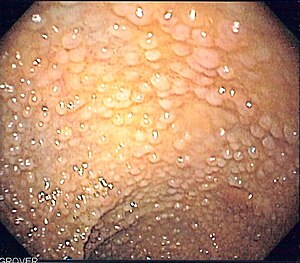Familial adenomatous polyposis
| Familial adenomatous polyposis | |
|---|---|
 |
|
| Endoscopic image of sigmoid colon of patient with familial adenomatous polyposis | |
| Classification and external resources | |
| Specialty | oncology |
| ICD-10 | C18, D12 |
| ICD-9-CM | 211.3 |
| ICD-O | 8220/0 |
| OMIM | 175100 |
| DiseasesDB | 4678 |
| eMedicine | med/769 |
| MeSH | D011125 |
Familial adenomatous polyposis (FAP) is an inherited condition in which numerous adenomatous polyps form mainly in the epithelium of the large intestine. While these polyps start out benign, malignant transformation into colon cancer occurs when they are left untreated. Three variants are known to exist, FAP and attenuated FAP (originally called hereditary flat adenoma syndrome) are caused by APC gene defects on chromosome 5 while autosomal recessive FAP (or MYH-associated polyposis) is caused by defects in the MUTYH gene on chromosome 1. Of the three, FAP itself is the most severe and most common; although for all three, the resulting colonic polyps and cancers are confined to the colon wall and removal can greatly reduce the spread of cancer.
The root cause of FAP is understood to be a genetic mutation—a flaw in the body's tumour suppressor genes that prevent development of tumours. The flaw allows numerous cells of the intestinal wall to develop into potentially cancerous polyps when they would usually reach the end of their life; inevitably one or more will eventually progress and give rise to cancer (7% risk by age 21, rising to 87% by age 45 and 93% by age 50). The flawed genes do not trigger cancer, but rather, they reduce the body's ability to protect against the risk of aged cells becoming cancerous. Even with the flawed gene, it may still take time before a cell actually does develop that is cancerous as a result, and the gene may in some cases still partially operate to control tumours, therefore cancer from FAP takes many years to develop and is almost always an adult-onset disease.
The second form of FAP, known as attenuated familial adenomatous polyposis has the APC gene functional but slightly impaired. It is therefore somewhat able to operate as usual. Attenuated FAP still presents a high 70% lifetime risk of cancer (as estimated), but typically presents with far fewer polyps (typically 30) rather than the hundreds or thousands usually found in FAP, and arises at an age when FAP is usually no longer considered likely—typically between 40 and 70 years old (average 55) rather than the more usual 30's upward. Because it has far fewer polyps, options for management may be different.
...
Wikipedia
